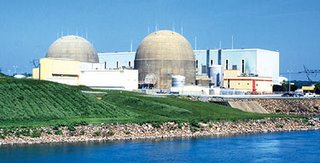
Today's edition of the Richmond Times-Dispatch is running an extensive story on the reasons why Dominion Virginia Power is considering building a new nuclear reactor at the North Anna Nuclear Power Station near Richmond. In short, Virginia needs the juice to power its high-tech economy:
Increases in all generation sources will be needed to meet a demand for power driven by electronics-heavy businesses, Grecheck said. For example, in Loudoun County alone, 10 to 20 proposed new data centers requiring 60 megawatts each would consume most of the output of the proposed new reactor, he said.A significant chunk of the nation's critical information infrastructure is located in Northern Virginia, and when groups like Public Citizen and BREDL mobilize anti-nuke activists to fight potential projects like North Anna, we need to be frank about what the costs would be to the state's economy if it were painted into the sort of corner that California finds itself in today.
I'm a citizen of the state of Virginia and I support new nuclear at North Anna.
POSTSCRIPT: The Virginia Department of Environmental Quality is scheduled to vote on November 16 on whether or not a new reactor would be consistent with coastal-zone protection laws.
Technorati tags: Nuclear Energy, Nuclear Power, Energy, Technology, Environment, Electricity, Virginia, North Anna Nuclear Power Plant, NRC
Comments